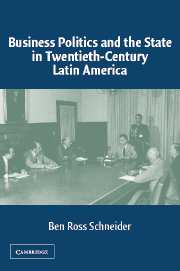Book contents
- Frontmatter
- Contents
- List of Tables
- List of Abbreviations
- Acknowledgments
- PART I INTRODUCTION AND ARGUMENTS
- PART II CASES AND COMPARISONS
- 3 From State to Societal Corporatism in Mexico
- 4 From Corporatism to Reorganized Disarticulation in Brazil
- 5 Business in Colombia: Well Organized and Well Connected
- 6 Consultation and Contention in the Making of Cooperative Capitalism in Chile
- 7 Business Politics in Argentina: Fragmented and Politicized
- PART III IMPLICATIONS AND CONCLUSIONS
- Appendix A Background Information on Major Business Associations
- Appendix B Interviews
- Appendix C Conversions
- References
- Index
3 - From State to Societal Corporatism in Mexico
Published online by Cambridge University Press: 23 November 2009
- Frontmatter
- Contents
- List of Tables
- List of Abbreviations
- Acknowledgments
- PART I INTRODUCTION AND ARGUMENTS
- PART II CASES AND COMPARISONS
- 3 From State to Societal Corporatism in Mexico
- 4 From Corporatism to Reorganized Disarticulation in Brazil
- 5 Business in Colombia: Well Organized and Well Connected
- 6 Consultation and Contention in the Making of Cooperative Capitalism in Chile
- 7 Business Politics in Argentina: Fragmented and Politicized
- PART III IMPLICATIONS AND CONCLUSIONS
- Appendix A Background Information on Major Business Associations
- Appendix B Interviews
- Appendix C Conversions
- References
- Index
Summary
We must all hang together, or assuredly we shall all hang separately.
Benjamin Franklin, 1776Introduction
A love–hate relationship is an apt metaphor for relations between business and government in twentieth-century Mexico. This analogy captures the often extreme passions in alternating periods of cooperation and conflict, as well as the complex entanglement of a rocky romance. This chapter tries to make sense of this entanglement by focusing on a few crucial variables – such as privileged access, threats to property rights, and political exclusion – that all encouraged big business in Mexico to invest in collective action. By the end of the twentieth century, big business in Mexico had created a wide range of voluntary associations and endowed them with lasting institutional capacity in the form of resources, professional staff, and capacity to intermediate member interests. These associations stand out as some of the strongest in the region.
The chronological account that follows covers some of the history of corporatist associations like Concanaco (Confederación de Cámaras Nacionales de Comercio), Canacintra (Cámara Nacional de la Industria de Transformación), and Concamin (Confederación de Cámaras Industriales), especially the episodes of creation, which reveal the motivations of state actors in seeking policy and political support in times of economic crisis and political vulnerability. However, the chapter focuses more on the relatively neglected voluntary associations – especially the economy-wide associations Coparmex (Confederación Patronal de la República Mexicana), CMHN (Consejo Mexicano de Hombres de Negocios), and CCE (Consejo Coordinador Empresarial) – that progressively displaced corporatist associations.
- Type
- Chapter
- Information
- Publisher: Cambridge University PressPrint publication year: 2004



